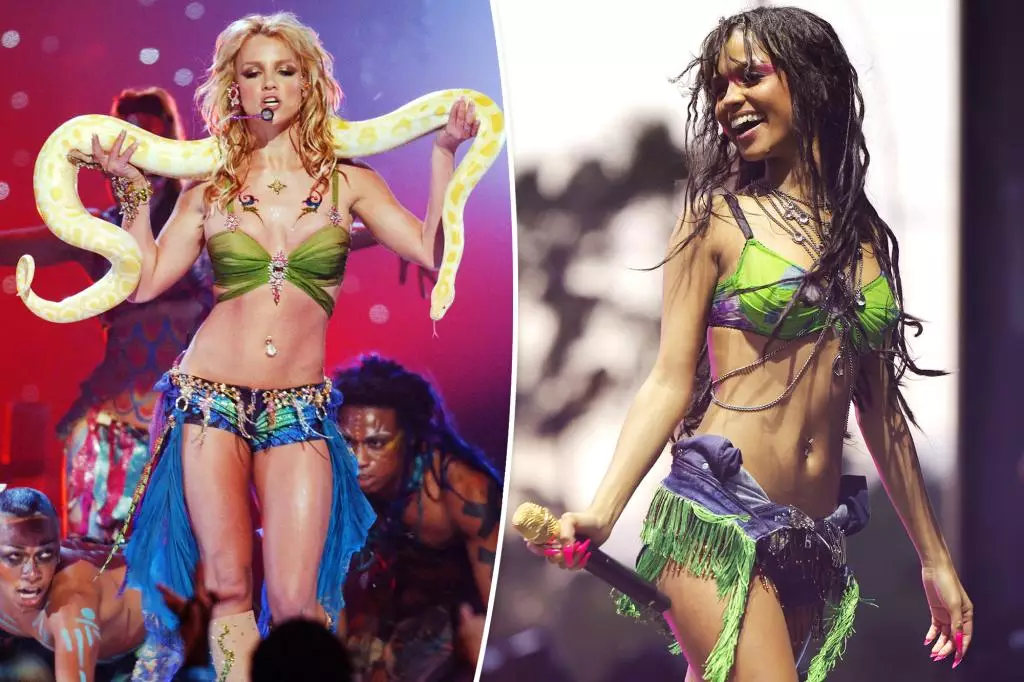Tyla, the South African pop sensation, has found herself at the center of a swirling controversy following her striking performance at Coachella 2025. As fans tuning in for the festival took stock of her wardrobe choices, many noticed an undeniable homage to Britney Spears, particularly the iconic look she donned during her jaw-dropping “I’m a Slave 4 U” performance at the MTV VMAs in 2001. Tyla’s ensemble—a green vintage balconette bra from Dolce & Gabbana’s Spring 2001 collection, paired with denim cutoffs adorned with beaded fringe and safety pins—led to ignited discussions among fans. The parallels were hard to ignore, sparking a mixture of admiration and scrutiny online.
While fashion has always had a knack for recycling trends and referencing legendary styles, Tyla’s insistence that her outfit was merely “fly” without any inspiration from Spears raises eyebrows. Her attempt to clarify the situation on social media, asserting “Love her but I just thought the outfit was fly… no inspo,” has only fueled the fire. Followers quickly jumped into the debate, casting doubt on her claims and labeling her directly as inauthentic. One comment read, “Do you not know what inspo means?” while others asserted that the resemblance was too striking to dismiss as purely coincidental. The situation currently sits at a heady intersection of admiration for nostalgia and the friction of originality.
The Impact of Pop Culture Associations
Critics are quick to highlight the intricate relationship artists share with fashion and the visual legacies left by pop culture icons like Britney Spears. This incident is not simply about one outfit; it reflects on how contemporary artists navigate their identities among the towering figures of the past. Tyla’s choice to adopt an aesthetic reminiscent of such a defining moment not only showcases her influence by a pop titan but raises questions about what ownership over style means in a modern context.
Interestingly, this is not an isolated incident for Tyla. A quick glance at her previous appearances reveals a consistent theme of drawing from established styles. Her outfit at the MTV EMAs 2024—a dazzling blue version of a tiger-printed gown by Roberto Cavalli, originally worn by Aaliyah—serves as another instance of her affinity for referencing pop culture history. This trend suggests that perhaps these nods are less about imitation and more about dialogue; Tyla’s stylistic choices invite audiences to remember and revive moments that have shaped music and fashion over decades.
The Bigger Picture: Authenticity vs. Influence
Ultimately, the discussions surrounding Tyla’s Coachella performance transcend mere clothing and venture into deeper queries about authenticity in the age of fashion references. Should artists strive for originality at all costs, or is there value in embracing the echoes of past icons? Tyla, with her evident admiration for both Spears and Aaliyah, highlights a generational embrace of past artistry that respects and revitalizes older styles.
As fans weigh in and social media debates rage on, it’s clear that this situation illustrates more than a simple fashion faux pas; it encapsulates broader conversations about creativity, influence, and the cyclical nature of trends within the entertainment industry. As artists continue to shape their identities through borrowed elements, audiences are left to ponder our role in scrutinizing—yet simultaneously celebrating—these intricate connections to the past.

